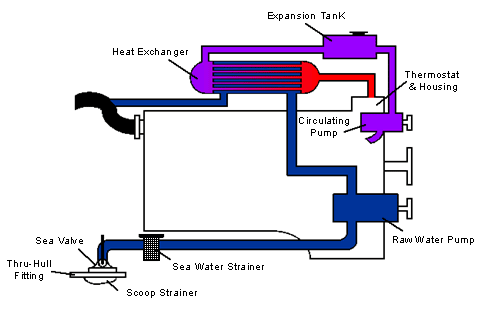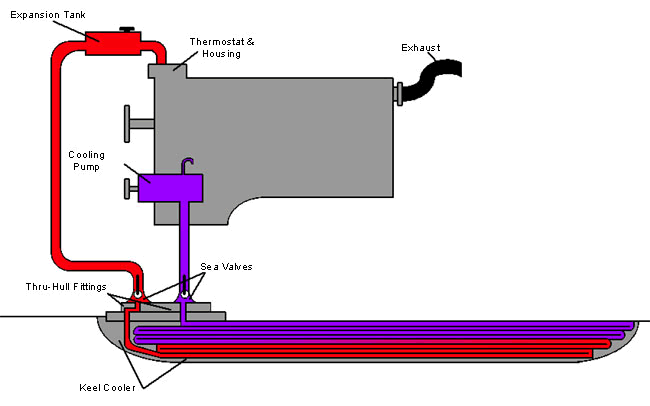Marine engines, much like automotive engines, require efficient cooling systems to maintain optimal performance and longevity. However, marine engines face unique challenges due to their operating environment. There are two main types of cooling systems used in marine engines—raw water cooling systems and fresh water (enclosed) cooling systems.
Raw Water Cooling Systems
A raw water cooling system draws water directly from the surrounding environment—such as seawater, lake water, or river water—and pumps it through the engine block before expelling it back outside the boat. These systems are simple and cost-effective, as they require only a pump and an inlet and outlet in the hull. However, they come with significant drawbacks:
- Corrosion Risk: Saltwater is highly corrosive, which can cause unseen damage to engine components over time.
- Shorter Lifespan: Engines using raw water cooling, especially with saltwater, generally have shorter lifespans due to increased corrosion.
Fresh Water Cooling Systems

Fresh water cooling systems, or enclosed cooling systems, are more complex but offer several advantages. There are two primary types within this category:
Heat Exchanger Systems
A heat exchanger system works similarly to a car radiator. Coolant (usually a mix of antifreeze and fresh water) circulates through one part of the heat exchanger, while raw water circulates through another part. The raw water cools the heated coolant before being expelled from the boat. This process ensures that the engine runs at optimal temperatures with reduced internal corrosion.
Keel Cooler Systems

Keel coolers eliminate the need for a heat exchanger by using the surrounding water to cool the engine coolant directly. Coolant is pumped through pipes or tubing attached to the hull’s exterior, where the external water cools it before it returns to the engine. This system simplifies the cooling process by removing the need for a raw water pump and related components.
Advantages of Fresh Water Cooling Systems
- Reduced Corrosion: Less exposure to corrosive raw water, especially saltwater, means longer engine life.
- Enhanced Cooling Efficiency: These systems allow engines to run at higher, more efficient temperatures, improving overall performance.
Marine Heat Exchangers
A marine heat exchanger is crucial for transferring heat from your boat engine’s coolant to the raw water pumped from outside the boat. The raw water flows through small tubes within a chamber filled with hot engine coolant. The cooler raw water absorbs the heat from the coolant, much like ice cubes in a hot soup, effectively reducing the engine’s temperature.
Choosing the Right Heat Exchanger
To ensure efficient cooling, it’s essential to match the heat exchanger to your boat’s engine specifications. At Go2marine, we offer over 100 models of heat exchangers from top manufacturers like Seakamp Engineering, as well as OEM options.
Expansion Tanks
An often-overlooked component, the expansion tank, plays a vital role in maintaining your cooling system’s efficiency. As engine coolant heats up, it expands, increasing its volume. The expansion tank provides space for this additional volume, preventing pressure build-up. In some systems, the heat exchanger includes an expansion tank, while in others, it is a separate component. Regularly check the cap on your expansion tank for leaks and corrosion, and replace it every two years to ensure optimal performance.
Conclusion
A well-maintained cooling system is essential for the longevity and performance of your marine engine. Whether you use a raw water or fresh water cooling system, understanding how marine heat exchangers work and their benefits can help you make informed decisions about your boat’s maintenance. If you’re experiencing problems with your heat exchanger or need a replacement, explore the wide selection of high-quality marine heat exchangers available at Go2marine.
Don’t leave your engine’s health to chance—ensure it runs smoothly with the right cooling system components.